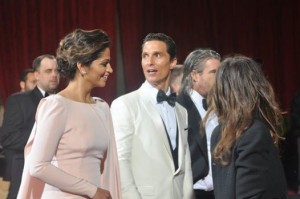After the gold rush: Analyzing the Oscar results
More than 160 years after his terrible ordeal, Solomon Northup is still making history. 12 Years A Slave, adapted from Northup’s harrowing account of being kidnapped and sold into slavery in the pre-Civil War South, won Best Picture last night at the 86th Academy Awards, beating out a slew of powerful contenders, including Gravity, American Hustle and The Wolf of Wall Street. Director Steve McQueen took the opportunity to dedicate the victory to all those who have experienced similar injustice, reminding his audience that slavery is still practiced in much of the world.

Feelin’ All Right · Matthew McConaughey won an Academy Award on Sunday for playing Ron Woodroof, a homophobic, HIV-positive electrician-turned-pharmaceutical smuggler in Dallas Buyers Club. Photo courtesy of Landon McDonald.
“Everyone deserves not just to survive, but to live,” McQueen said, harkening back to one of the film’s most resonant lines. “This is the most important legacy of Solomon Northup. This is for all the people who have endured slavery, and the 21 million people who still endure slavery today.”
Despite the intense speculation swirling around this year’s Oscars, Sunday’s ceremony was fairly conventional for the most part. From Best Actress Cate Blanchett’s well-deserved but inevitable win for Blue Jasmine to Gravity’s clean sweep of the major technical categories, the evening’s frontrunners went largely unchallenged. The show itself, hosted with amiable aplomb by Ellen DeGeneres, was an energetic but slapdash effort, full of unnecessarily long sketches and musical numbers that made it seem as if the comedienne and her fellow presenters were either belaboring the point or actively stalling for time.
There were bright spots of course, none more luminous than relative newcomer Lupita Nyong’o, who at some point during her charming, heartfelt acceptance speech transformed from talented ingénue into a bonafide movie star. The Yale School of Drama graduate, who won Best Supporting Actress for her heartbreaking turn as field slave Patsey in 12 Years A Slave, was clearly overwhelmed by the time she arrived in the pressroom for her post-win interview. When she did speak, however, she paid tribute to her tragic character and the millions of women in comparably hopeless situations.
“It doesn’t escape me for one moment that so much joy in my life is because of so much pain in someone else’s,” she said, her voice etched with emotion.
Another one of the night’s biggest winners was Alfonso Cuarón’s Gravity. The effects-laden thriller space-walked away with seven Oscars, including wins for Best Director (a historic first for a Latin-American filmmaker), Best Cinematography, Best Film Editing, Best Visual Effects, Best Original Score, Best Sound Mixing and Best Sound Editing. The movie, a four-year labor of love by one of the most gifted visual storytellers in the medium, is the rarest of mainstream hits: a spectacle of substance whose pioneering visuals never once steal the focus from the film’s human characters, especially Sandra Bullock’s grieving, panic-stricken medical engineer. If it weren’t for the gale-force intensity of Blanchett’s Blue Jasmine performance, Bullock would have been a shoo-in for Best Actress.
Even though some of the night’s winners seemed almost preordained, there were plenty of surprises as well. Joshua Oppenheimer’s The Act of Killing, which asked former Indonesian death-squad leaders to recreate their crimes in the form of their favorite film genres, is one of the most sobering portraits of evil ever filmed, but it ultimately lost out to 20 Feet from Stardom, a bubbly crowd-pleaser based around the trials and travails of several generations of back-up singers.
The mawkish live-action short Helium defeated the star-studded pedigree of The Voorman Problem, while the throwback Mickey Mouse animated short Get a Horse was thrown from its saddle by the French-Luxembourgish import Mr. Hublot. And although Disney’s Frozen was considered a virtual lock to win in the Best Animated Feature race, a vocal contingent of Oscar analysts remained convinced that Hayao Miyazaki’s farewell masterpiece The Wind Rises would score a last-minute upset.
Then there was the night’s best underdog story. Dallas Buyers Club, an AIDS drama that had initially struggled to find an audience due to its grim subject matter, ended up becoming an awards season mainstay, ultimately receiving three Oscars: Best Actor, Best Supporting Actor and Best Makeup and Hairstyling (the budget for which consisted of about $250 for the entire 28-day production). Much of the film’s emotional impact can be placed on the skeletal shoulders of Matthew McConaughey and his portrayal of Ron Woodroof, a hard-living, homophobic electrician who turns to smuggling unapproved pharmaceuticals in order to help local AIDS patients get the medication they need in the wake of his own diagnosis. Best Supporting Actor winner Jared Leto also garnered accolades for his performance as Rayon, a transgender patient who helps Ron run his new business.
After his acceptance speech, Leto caused a minor uproar in the pressroom when he allowed members of the media to pass around his new golden friend.
“Does anyone want to try it out for size?” Leto asked, offering his statuette to the nearest journalist. “You can fondle it if you want to. Pass it around, but if you have the swine flu, please don’t touch. I bet this is the first time someone has given away their Oscar for an orgy in the press room!”

